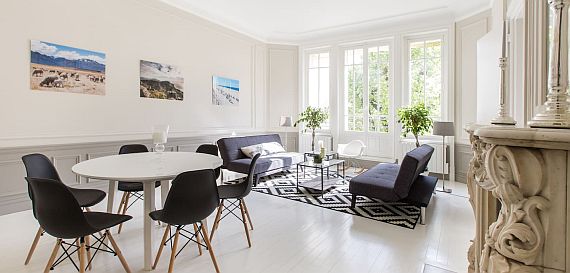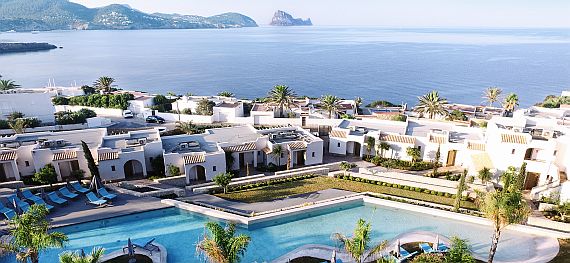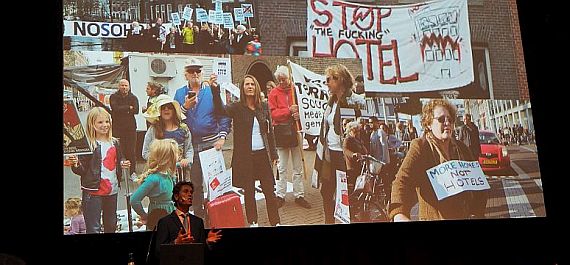
News & Stories
London/Bethesda. Concerning its brand Tribute Portfolio Homes, Marriott International did not announce a mega rollout, just the contrary: The newest baby, which provides home rental, is allowed to grow slowly. The bed giant is moving in unknown waters, following the slogan "learning by doing", and its partner is the British start-up Hostmaker. The six-month trial period with this partner has been extended and they have just taken on new homes in Paris, London and Lisbon together. Belinda Pote, Chief Sales and Marketing Officer Europe at Marriott, explained the first steps and experiences to Maria Puetz-Willems in London.
Linz. Inspired by its role as "European Culture Capital 2009", the City of Linz in Upper Austria has now organised the first TravelCulture congress. The biggest mistake, Prof Harald Pechlaner said at the beginning of the congress, was to leave tourism developments up to tourism companies. Cities like Linz are to make it on to the map as a location identified with a new kind of travel. Congress participants were invited under the new concept of the "Blue Meeting" not into the congress hall, but rather into the city and into its culture. A new approach for destinations that want to get close to their short-stay travellers.
Berlin. Of all, the "Instagram" generation is driving the phenomenon of overtourism. It's exactly this species of traveller who seeks out the world's most remote and beautiful spots and shares the photos on social media. After that, the hunt for the destination begins... The perversion of the desire to travel. "Expectations and reality are no longer aligned," Prof Harald Zeiss says from the Institute for Sustainable Tourism at Harz University in Wernigerode. The academic as well as a politician and city representatives expressed their concerns for overtourism – even in Germany – in Berlin. They call for more critical voices and control measures.
Berlin. Climate change, innovative forms of transportation, overtourism and changing customer demands are the key topics of the speeches, discussions and workshops at the ITB Convention 2019 in Berlin. And: The event is moving to the CityCube. Also new: Deep dive sessions to deepen the topics in a small circle.
Athens. The Mediterranean region has been outperforming the rest of Europe recently. The continuing upswing is also attracting reputable hotel brands and international investors who are putting huge sums of money on the table for resorts. At the recent "Mediterranean Resort & Hotel Real Estate Forum" in October 2018 at the Divani Apollon Palace & Thalasso in Vouliagmeni, Greece, on the 'Athens Riviera', three quite different resorts were presented, including: the Astir Palace Hotel Athens, Four Seasons' coming entry into the Greek market; Borgo Egnazia, a 'transformative' luxury resort in Puglia; and the 7Pines Resort Ibiza, a more conventional luxury seaside resort.
Hanover. More adult hotels, glamping, surf camps, the digital selection of hotel rooms or a sharp increase in private label hotels: TUI Deutschland has put together an offer for the coming season based on various trends. In addition, the tour operator is introducing new destinations and is noting in its booking behaviour that Germans are still in a consumer mood.
Berlin. The German Holiday Home Association welcomes five new members into its midst. The most recent addition is HomeToGo, the world's largest search engine for holiday accommodation.
Athens. It was a nice summer for the Greek hospitality and tourism segment. From July to September 2018, total arrivals at local airports increased by 7.5% compared to the same period of last year, with the Athens airport recording a +15.3% peak. At the same time, hotel RevPAR in most Greek destinations increased at a faster pace than in most other competitive European locations.
Munich/Amsterdam. From the marketing campaign "I amsterdam" to a textbook example of overtourism: Lots has changed in the Dutch capital city over recent years, and not all of it for the better. Yet some problems are homemade, as René van Schie indicates, Leisure Director at Metropoolregio Amsterdam. At the "Hospitality Industry Dialogue" at this year's Expo Real he explained how the city is responding to the masses of tourists Amsterdam is now receiving. Among insiders, the reaction is viewed as exemplary.
Vienna. After a short breather, the next hotel projects are sprouting from the ground in Austria's booming capital city. The hotel area around Vienna's Central Station is flourishing and is doing much better than anticipated – so good in fact that even budget brands are able to sell their rooms for EUR 200 per night. Insiders still see great potential – despite the many projects announced set to commence operation over the next two years. At the same time, Vienna's West Station is losing its appeal. Fred Fettner was in Vienna and summarises the mood.






